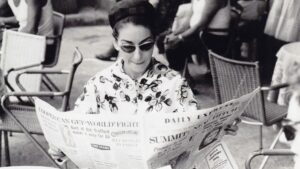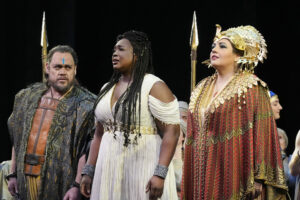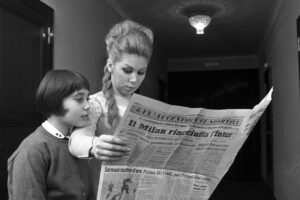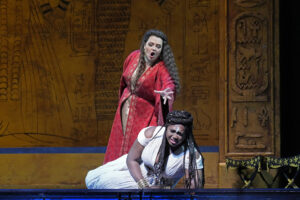

Now, don’t get La Cieca wrong. Fred is an intelligent guy with excellent taste, and he’s not an axe-grinder. But I do think he’s reasoning from a fundamentally flawed premise, which is that the way to remedy problems in the present is to somehow return to practices that worked (or that you remember as having worked) in the past.
Fred wants his old Met experience back, or rather he wants feel the same things going to the Met now that he did when he went there 30 years ago. But that’s not artistic vision so much as it is simple nostalgia. You can’t get that exactly same feeling back for any number of reasons, primarily because you’re not the same person you were half a lifetime ago.
Goodness knows La Cieca isn’t that same bright-eyed girl who stepped off the bus into Manhattan in 1988, and while she now and then dreams of reliving some of the positive aspects of that bygone era (such as the ability to thrive on a diet consisting primarily of cheeseburgers and pepperoni pizza whilst remaining whippet-thin), she realizes that a) it’s impossible and b) even if it were possible, actually living that life wasn’t nearly so rosy as recalling it in tranquility decades later. (No, I would not like to go back to renting that maid’s room on 155th Street with the single window ideally situated to transmit the noise of the West Side Highway, broken only by the nightly wail of car alarms from 9 PM to dawn.)
But, going back to Fred. The solution for the future is not retreating into the past. You may find the Met’s current “dynamic” method of pricing tickets confusing or even unfair, but that’s the way tickets are priced these days, and, frankly, it’s only the olds (and the youngs whose thinking is already as hidebound as the olds’) who continue to rail against this accomplished fact. You may long for the sight of those dusty old paint-by-numbers portraits of long-dead singers in Founders’ Hall, the same couple of dozen of daubs in exactly the same place for decades on end. But for the vast majority of operagoers, these paintings are either irrelevant or actively a turnoff: they look like something from your grandmother’s house or from one of those wings of the Metropolitan Museum you had to go to in junior high.
The Chagalls are great, dated but great, and the point is, you can still see them: you just from time to time can also see a banner, the sort of banner that most arts institutions hang on their portals. Is the art on the banner always up the the level of the Chagalls? No, obviously not. But the purpose of a banner is not to create art that you will return to again and again for 50 years or more (like the Chagalls); it is to create a sense of occasion around what the Met is at least trying to position as a special event, something that will happen for a short time and if you don’t act now, you’ll miss it. Getting people into something as important and excellent as Prince Igor—without having to rely on slow and inexact word of mouth—is a valuable goal and, to my mind, a legitimate use of the company’s public-facing real estate. When an opera company is struggling to sell tickets, the luxury of treating the theater plant as an objet d’art sometimes has to be abandoned temporarily, even if the desecration of the temple causes an unpleasant feel or two in the Fred Plotkins of this world.
And the same thing applies to mattesr more directly relevant to the art of opera. Casting, for example. Fred and any number of other aficionados lament the absence of all sorts of wonderful singers who (they assure us) are banned from the Met for their inability to live up to Peter Gelb‘s shallow standards of prettiness and slimness. But when you ask for the names of these wonderful singers, the answer (not from Fred, who never answered the question) is inevitably, “Mariella Devia. Edita Gruberova, Leo Nucci, Ewa Podles….” In other words, singers of the past who happen still to be singing in the present. We’re assured that there is this vastissimo public out there who would just knock down the doors fo the Met to hear one of these neglected singers if Gelb would deign only to give them a tumble. And yet, when one of these artists, even one so lovely and talented as Ms. Devia, finally does appear in New York, she sells, what, a thousand tickets, 1500? (Surely half or more of the crowd at Carnegie Hall for last night’s Roberto Devereux was paper.)
Or the regie thing. Guys, the battle is over and you lost, or rather, everyone on your side either aged out of the audience demographic or else stopped going to the opera for reasons of their own. There is no significant audience for a new “Zeffirelli” production, and, with only a few exceptions, there is hardly an audience even for the vintage Zeffirelli. (La bohème continues to sell well as a sort of operatic Nutcracker, and the mock-Zeffirelli Aïda at least gets a hand for sheer labor-intensiveness. The Turandot, which felt insincere from the very beginning, is on its last legs). And, more to the point, nobody else is directing opera in this heavily realistic way any more: David McVicar and Richard Eyre, though they have the requisite lack of imagination, are too fundamentally glum to create anything tacky enough to truly delight the Sybil Harrington brigade.
Understand that none of this is to suggest that the Met is doing a perfect, or even a very good job of presenting opera. But whatever the Met’s problems, the solutions lie in the future, not in the past. “The songs Glenn Miller played” were great, but playing them now is nostalgia, not music.

























Comments